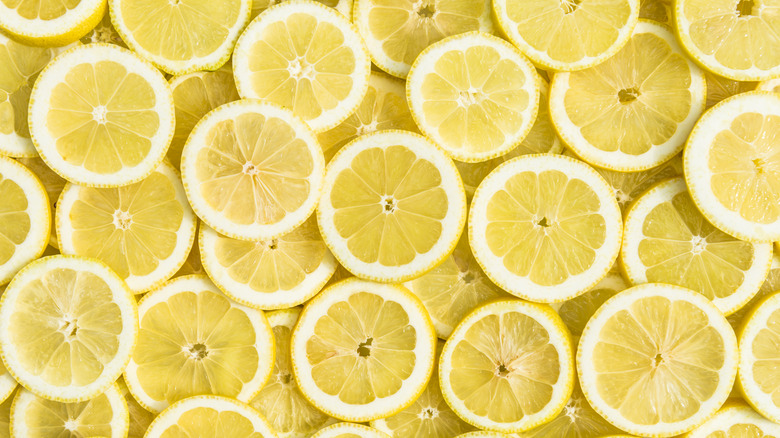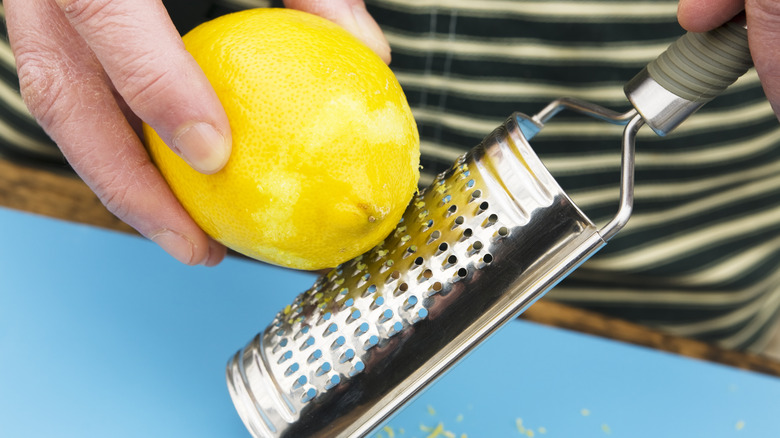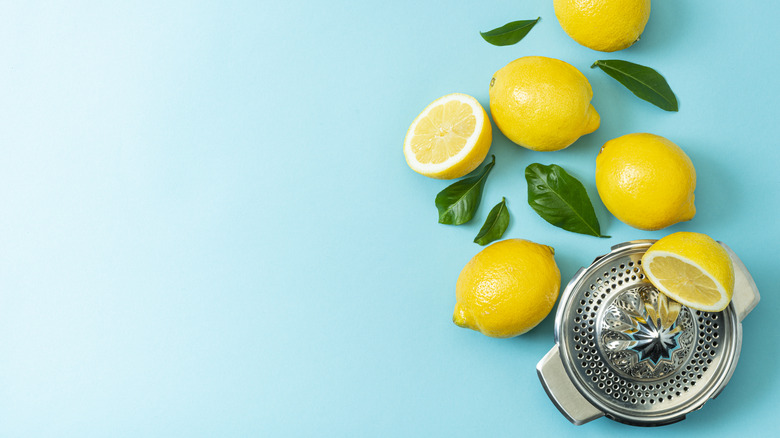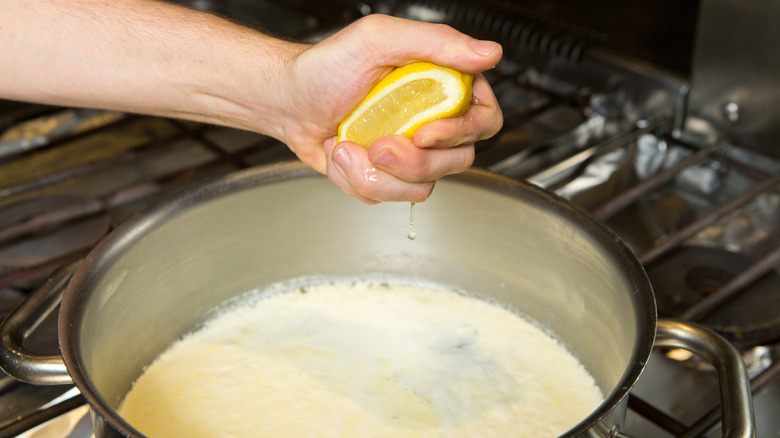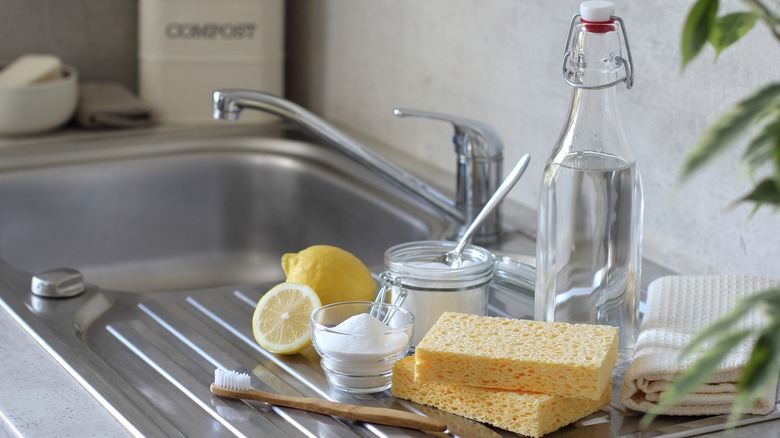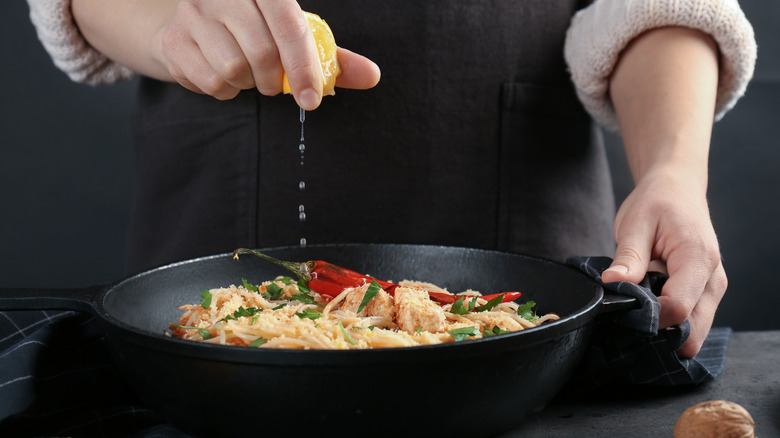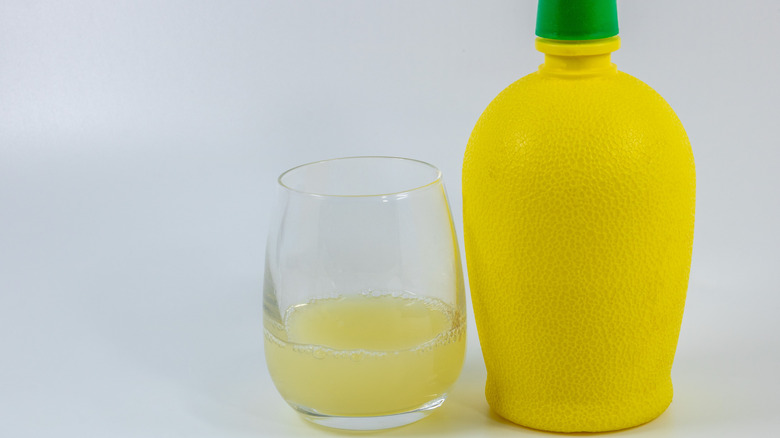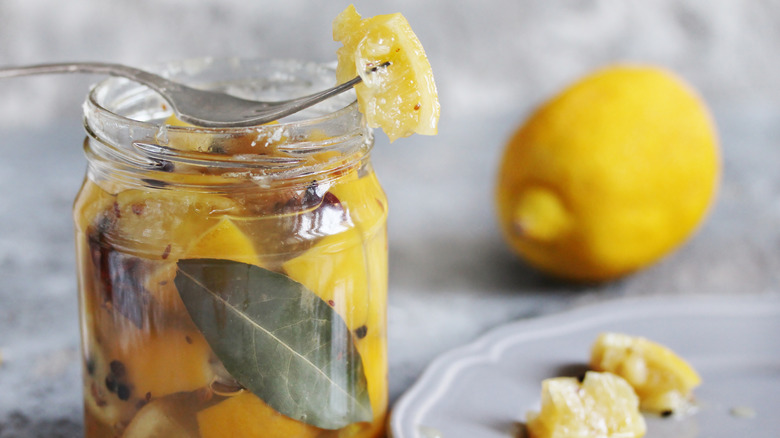12 Mistakes Everyone Makes With Lemons
Lemons are one of the most ubiquitous ingredients in the culinary world. You can use these versatile fruits for everything from cakes and desserts to soups and stews. Is there anything that lemons can't do? Well, they can't help you with an algebra problem ... but if they could do math, we bet they'd be great at it. Can you tell we're big lemon fans? Even though we use them so regularly, there are a range of mistakes that most cooks make with lemons.
From ignoring lemon zest to adding lemon to your recipes too soon to using bottled juice instead of the fresh kind, people make all kinds of mistakes with lemons. But there's no need to just accept your fate as a subpar user of lemons. Once you learn about the mistakes you're making, it's easy to resolve them. It might seem like a simple thing, but knowing how to make the most of lemons can improve your cooking, save you money, and prevent waste.
Join us as we explore the pitfalls to avoid and the secrets to harnessing the full zest of lemons in every kitchen creation. You might be surprised what a difference it makes, and you'll soon want to show off your culinary prowess to all your family and friends.
1. Letting cut lemons dry out
One of the most common mistakes people make with lemons is letting cut lemons dry out. It's a scenario that plays out in kitchens far and wide — you slice a lemon, use a portion of it for your recipe or drink, and then forget about the rest until you discover the sad, shriveled remains on your counter or in the fridge days later. Not only does this result in a waste of precious citrus, but it also robs you of the lemon's potential to enhance your cooking.
The solution lies in proper storage. To prevent cut lemons from drying out, wrap them tightly in plastic wrap or place them in an airtight container. The goal is to minimize their exposure to air and moisture, which accelerates the drying process. For those seeking an eco-friendly alternative to plastic wrap, beeswax wraps can also be used to wrap cut lemons, offering both protection and sustainability.
Stored in this way, lemons stay fresh for around three to five days. By implementing these simple storage techniques, you can extend the life of your cut lemons, making sure they remain plump, juicy, and ready to infuse your dishes and beverages with their vibrant flavor.
2. Not getting as much juice out as possible
Many people give lemons a hearty squeeze by hand and then chuck them in the trash or compost, but that alone typically won't remove all the available lemon juice. It's disheartening to think about the untapped potential left behind when you discard seemingly spent lemon halves. Fortunately, there are techniques to ensure you squeeze every last drop of liquid sunshine from your lemons.
Firstly, temperature plays a crucial role. When juicing, consider microwaving the lemon for about 10 seconds or submerging it in hot water for a minute — this softens the fruit and allows the juice to flow more freely. These simple tricks can make all the difference in how much juice is released.
You should also consider rolling your uncut lemon firmly against your countertop before slicing it open. This helps to break down the internal membranes and makes juicing more efficient. You can also use a fork to squeeze more juice out of the inside of your lemons. By adopting these strategies, you can ensure that no drop of lemony goodness goes to waste. This way, you'll waste less and get more flavor into your recipes — everyone's a winner.
3. Ignoring the zest
Lemons are cherished in kitchens worldwide, yet a common mistake that often occurs is overlooking the zest. Many aspiring chefs and home cooks focus solely on the juice, discarding lemon zest as an afterthought. However, a lemon's outer layer holds a treasure trove of flavor and fragrance that can elevate dishes from ordinary to extraordinary.
To fix this oversight, you must first understand the art of zesting. The zest is the colorful, aromatic layer of the lemon's peel, containing essential oils that carry intense citrusy notes. When grating the zest, it's crucial to use a fine grater or a zester to avoid capturing the bitter white pith beneath. Gently glide the lemon against the grater's surface, rotating as needed, to obtain the delicate zest without delving into the bitter layer. You can also use a paring knife to get long strands or twists of lemon zest.
The next step is to incorporate the zest into your culinary creations. Sprinkle it atop salads, pasta dishes, or grilled vegetables for an instant burst of freshness. Consider infusing desserts like cakes, cookies, or ice creams with lemon zest to introduce a delightful contrast to the sweetness. Moreover, the zest can lend depth and complexity to marinades, dressings, and sauces, giving your savory dishes an enchanting twist. If you can't use it right away, you can freeze it for later use or add it to a jar of sugar to infuse it with a lemony flavor.
4. Not using a citrus juicer
If you're squeezing your lemons by hand, you're missing out on a simple solution — using a citrus juicer. Many folks rely on manual squeezing methods or makeshift tools, but this isn't the Pioneer Era. You can pick up a citrus juicer from any homeware store and make your life easier. Juicing by hand can lead to not only a less-than-optimal yield of juice but also unnecessary exertion and mess. Fortunately, integrating a citrus juicer into your kitchen arsenal easily rectifies this situation.
A citrus juicer is a purpose-built device designed to extract maximum juice from lemons and other citrus fruits while minimizing effort and mess. Its efficient design ensures that every drop of juice is effortlessly extracted, leaving behind minimal pulp and seeds. The use of a juicer significantly reduces the physical strain associated with manual squeezing methods, making it an ideal solution for both occasional cooks and culinary enthusiasts.
When using a citrus juicer, begin by cutting the lemon in half and placing one half onto the juicer's cone. Apply gentle pressure to the lever or handle, allowing the juicer to do the work. The juice will flow directly into a container, leaving you with a mess-free extraction process. There are also manual juicers that you use by halving your lemons and pressing them on a cone.
5. Causing dairy to curdle
While lemons add a zing to dishes, their acidity can cause dairy products, like milk or cream, to curdle. Imagine you've just made a delicious creamy pasta recipe. Then, you add some lemon to cut through the rich creaminess and the whole thing turns into a curdled mess. However, with a bit of knowledge and careful execution, you can easily avoid this problem.
The key to preventing curdling lies in controlled integration. When a recipe calls for the combination of lemons and dairy, it's crucial to introduce the lemon juice gradually, allowing the dairy to adjust to the acidity. Start by tempering the dairy with a small amount of lemon juice or zest before incorporating larger quantities. This gradual approach helps to minimize the shock to dairy proteins and reduce the likelihood of curdling.
Starches also help to prevent curdling, so sauces that start with a roux of butter and flour or that incorporate cornstarch are less likely to curdle. Or you can add a squeeze of lemon to a dish once it's plated rather than mixing it into the dish.
Another tip – choosing full-fat dairy products can enhance stability. The higher fat content provides a buffer against curdling, as fat molecules can envelop proteins and prevent them from binding excessively. Using ingredients like heavy cream or whole milk can contribute to a smoother integration with lemon juice.
6. Not using lemons for cleaning
We all know lemons add their magic to food and drink, but one mistake you might be making is not using them for cleaning. They're excellent natural cleaning products, which is great news if you like to avoid harsh chemicals. Cleaning is also a great use for lemons that may have gone a little past their best-by date or shriveled in the fridge.
Lemons are excellent at combating odors. Consider using lemon slices or peels in areas prone to unpleasant scents, such as garbage disposals, trash cans, or even your refrigerator. The natural citrus oils effectively neutralize odors, leaving a fresh aroma in their wake.
Lemons' acidic properties can also dissolve hard water stains and mineral buildup. To tackle faucets, showerheads, or glass surfaces marred by stubborn deposits, rub them with a lemon half and let the juice work its magic for a few minutes before rinsing and wiping clean.
For a powerful homemade all-purpose cleaner, combine lemon juice with water and vinegar. This concoction not only sanitizes surfaces but also imparts a delightful, natural fragrance. Lemons can also restore the shine to dull stainless steel appliances or copper pots — simply rub the surface with lemon juice, rinse, and polish.
When microwaving leaves behind stubborn stains and odors, place a bowl of water containing lemon slices inside and heat it for a few minutes. The steam generated will loosen grime, while the lemon scent refreshes the interior.
7. Adding lemon to dishes too early
A frequent and somewhat counterintuitive cooking error is adding lemon to dishes too soon. While lemons can impart a delightful burst of tangy freshness, their vibrant acidity can sometimes lead to bitterness and discoloration if introduced too early in the cooking process.
The key to fixing this mistake is simple. When a recipe calls for lemon juice or zest, wait until you've taken it off the heat before adding lemon juice to the mix. This approach ensures that the lemon's bright notes and acidity remain pronounced without dominating the overall taste profile. Aim to incorporate lemon just moments before serving to provide a vibrant lift to the dish.
This might not seem like it makes sense. You want a lemon flavor in your food so, in theory, you should add it early in the cooking process so that the flavors meld and infuse. However, lemon juice simply doesn't react all that well to being heated in many cases, so cooking it in a dish for too long leaves a funky flavor. Let lemon arrive fashionably late to the party and this problem disappears.
8. Not trying the skewer hack
A frequently overlooked yet effective hack in the world of lemon juicing involves a simple skewer and a clever technique. Many individuals struggle to extract the maximum amount of juice from lemons, often settling for less-than-optimal yields. Or they end up making a mess, struggling to extract seeds from the juice or letting their lemons dry out. However, a straightforward fix exists in the form of the skewer hack.
So, what is the skewer hack? It basically involves making a hole in the end of a lemon to extract juice through. The first step is to roll the lemon hard against your counter. This breaks the membranes inside the fruit so the juice flows out more easily. Then, simply insert a skewer into the lemon's stem end, twisting it gently to create a small hole. Then squeeze the lemon and see the juice flow.
Not only is this a great way of getting plenty of juice out of lemons, but you also won't end up with sticky hands. What's more, the seeds stay inside and there's no cut half to deal with, so you won't need to wrap leftovers in cellophane. Whether you're crafting a refreshing beverage, preparing a zesty dressing, or adding a citrusy kick to a savory dish, the skewer hack can be your secret weapon for maximizing the potential of lemons.
9. Using bottled lemon juice
If you're using bottled lemon juice as a substitute for fresh lemons, you're making a big mistake. While bottled lemon juice offers convenience, it pales in comparison to the vibrant flavor and aroma of freshly squeezed lemons. Bottled lemon juice often contains additives and preservatives that can impart a slightly off taste and lack the nuanced complexity of natural citrus. By opting for fresh lemons, you can introduce a burst of genuine flavor that elevates your dishes to new dimensions.
When a recipe calls for lemon juice, prioritize using freshly squeezed lemons. The process is straightforward: Roll the lemon on a countertop to break down the internal membranes, making it easier to extract the juice. Then, cut the lemon in half and squeeze out that juice. Sure, it takes a few extra moments, but it makes all the difference to the results.
And don't underestimate the value of lemon zest. The aromatic oils present in the zest contribute depth and intensity to dishes that bottled lemon juice simply cannot replicate. Use a fine grater or zester to collect the zest and introduce it into your recipes — from desserts to savory dishes — for an added layer of flavor. By pivoting away from bottled lemon juice and embracing the natural allure of fresh lemons, you'll transform your culinary creations into masterpieces.
10. Not using it to brighten dishes
Have you ever made a meal, tasted it, and thought it was just okay? It needed a little something extra, but you weren't quite sure what. Often that something is a touch of lemon juice. You see, these vibrant citrus fruits possess an innate power to cut through richness, add depth, and awaken the flavors of a wide array of foods. You just need to understand how and when to use lemons to brighten a dish.
In savory fare, a splash of freshly squeezed lemon juice can counterbalance heavy, rich flavors. For example, a squeeze of lemon over creamy pasta or roasted vegetables can introduce a refreshing contrast. In desserts, lemons can provide a nuanced complexity that elevates the overall taste. A dash of lemon zest in baked goods, custards, or fruit salads can add a delightful tang that balances sweetness and enhances other flavors present.
The timing of lemon incorporation is crucial. Often, a touch of lemon towards the end of cooking or as a finishing touch can have a more pronounced impact. By recognizing lemons as a dynamic tool, you can improve all manner of dishes. Adding lemon to brighten a recipe doesn't mean the lemon will play a major part in the flavor profile — it's just there to balance out the flavors.
11. Zesting too early
An often-underestimated aspect of working with lemons is the timing of zesting. When you zest too far in advance, it can result in the loss of the zest's potent aromatic oils, diminishing the vibrant essence it brings to dishes. However, there's a straightforward solution to ensure you harness the full zestful potential of lemons.
When zesting lemons, consider the principle of timing and freshness. Lemon zest contains concentrated essential oils that release their intense aroma and flavor upon contact. When zest is exposed to air for extended periods, these oils can evaporate, diminishing the zest's potency. The fix lies in zesting lemons just before they're needed in your recipe. Adopt a just-in-time approach to zesting, ideally minutes or a short time before incorporating the zest into your dish. This ensures that the aromatic oils are at their peak, infusing your culinary creation with the fullest spectrum of citrusy notes.
In cases where you think you'll need lemon zest in the future, consider freezing it. Grate the desired amount of zest and freeze it in an airtight container. This way, you can access the zest's intense flavor whenever you require it, without the risk of premature evaporation.
12. Ignoring preserved lemons
Preserved lemons are commonly overlooked gems in the culinary world. Many people miss out on the chance to harness the unique depth and complexity these preserved citrus treasures can bring to their dishes. Preserved lemons are created through a process of salting and fermenting, which softens the rind and mellows the sharpness, resulting in a uniquely rich and intense lemon flavor. You can use the whole lemon, imparting a potent citrusy punch to a variety of dishes.
Their complex, slightly tangy taste pairs well with both savory and sweet dishes. Enhance salads, stews, couscous, rice, and pasta dishes with the distinctive allure of preserved lemons. Or add them sparingly to desserts for a complex, sophisticated note.
Remember that preserved lemons are a potent ingredient, so start with a modest amount and adjust to taste. They offer a transformative touch that can turn ordinary dishes into culinary revelations. By incorporating preserved lemons into your culinary repertoire, you'll infuse your creations with an exotic, multidimensional flavor that captivates the senses. If you've been ignoring preserved lemons, the fix is simple: Pick up a jar at your local supermarket and get cooking.
